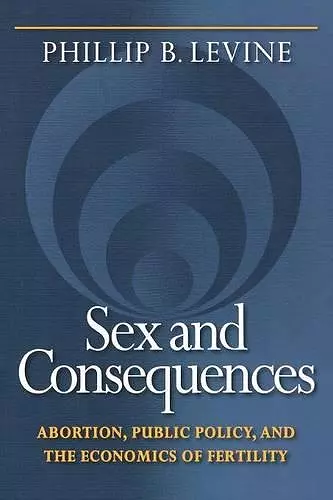Sex and Consequences
Abortion, Public Policy, and the Economics of Fertility
Format:Paperback
Publisher:Princeton University Press
Published:3rd Jul '07
Currently unavailable, and unfortunately no date known when it will be back

This book provides a readable look at the social science research and data on the use of abortion and the consequences of policies that affect abortion access. I highly recommend it as a clear-headed presentation of the growing research literature designed to evaluate abortion policies. Even for those less interested in the topic of abortion, the book provides a useful discussion of how to effectively evaluate an important social policy issue. -- Rebecca M. Blank, Henry Carter Adams Professor of Policy and Dean, Gerald R. Ford School of Public Policy, University of Michigan This book represents the most thorough examination I've seen on the effects of abortion policy on reproductive choice. -- Ted Joyce, Baruch College
How do individuals change their behavior when abortion access increases? This book uses economic analysis to consider this question, comparing abortion to a form of insurance. It includes an analysis which suggests that the manner in which individuals change their behavior depends on the extent to which abortion is accessible.How do individuals change their behavior when abortion access increases? In this innovative book, economist Phillip Levine uses economic analysis to consider this question, comparing abortion to a form of insurance. Like insurance, he contends, abortion provides protection from downside risk. A pregnant woman who would otherwise give birth to an unwanted child has the option to abort. On the other hand, the availability of this option may increase the likelihood of a pregnancy in the first place. In a very restrictive abortion environment, few women would choose to have an abortion; legalizing abortion would reduce unwanted births. But if abortion becomes readily available, it may cause individuals to increase their sexual activity and/or reduce their use of contraception, Levine contends. Women will become pregnant more frequently, but will abort those pregnancies. Therefore, these abortions will not reduce unwanted births. Levine's analysis suggests that the manner in which individuals change their behavior depends on the extent to which abortion is accessible. He supports these assertions using data from both the United States and Eastern Europe, comparing areas that have restricted access to abortion services with those that have liberalized access. Using sound economic analysis, Sex and Consequences goes beyond the ideological arguments that frequently dominate the abortion debate, lending a new perspective to this controversial subject.
"The book's virtues are formidable. Levine writes clearly, avoids jargon ... and is unfailingly civil in characterizing the positions in the abortion debate."--Charles Murray, Public Interest "Readers unfamiliar with the academic economic publications of Levine (Wellesley College) will find his approach ... novel and intriguing... Levine does a thorough job of providing the institutional (both domestic and international) and analytical background to make the work accessible to economists as well as to readers not trained in economics... Highly recommended."--Choice
ISBN: 9780691130453
Dimensions: unknown
Weight: 340g
240 pages